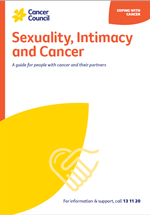- Home
- Ovarian cancer
- Managing side effects
- Impact on sexuality and intimacy
Impact on sexuality and intimacy
Ovarian cancer can affect your sexuality in physical and emotional ways.
Learn more about:
- Overview
- Physical changes
- Emotional changes
- Tips for managing sexual changes
- Podcast: Sex and Cancer
Overview
How ovarian cancer affects your sexuality depends on many factors, such as treatment and side effects, your self-confidence, and whether you have a partner. It is natural to experience changes in your desire to have sex.
It is important that your sexuality is respected and you feel comfortable when discussing how cancer treatment will affect you. Whatever your gender identity or sexual orientation, your medical team should be able to discuss your needs and support you through treatment.
For more on this, see our general section on Sexuality, intimacy and cancer and listen to the podcast below.
Physical changes
Treatment can cause dryness and scarring of the vagina, and internal scar tissue. These side effects can make sexual penetration painful, and you may have to find different ways to orgasm. Removal of the uterus, cervix and ovaries can change how you experience sexual pleasure. The experience of having cancer may mean you lose interest in intimacy and sex (low libido).
Emotional changes
For most people, sex is more than arousal, intercourse and orgasms. It involves feelings of intimacy and acceptance, as well as being able to give and receive love. Although sexual intercourse may not always be possible, closeness and sharing can still be part of your relationship.
Changes to your body can affect the way you feel about yourself (your self-esteem) and make you feel self-conscious. You may feel less confident about who you are and what you can do. Give yourself time to get used to any changes. You may benefit from talking to a professional such as a psychologist or sexual therapist. Your doctor will be able to help with a referral.
Tips for managing sexual changes
- Enjoy physical touch with your partner without having sexual intercourse to maintain intimacy.
- Try touching, hugging, massaging, holding hands and having a bath together.
- Let your partner know if you don’t feel like having sex, or if you find penetration uncomfortable.
- Talk to your doctor about ways to manage side effects that change your sex life. These may include using vaginal dilators, lubricants and moisturisers.
- If you find that vaginal dryness is a problem, take more time before and during sex to help the vagina relax and become well aroused.
- Lubricant helps with vaginal dryness. A water-based or silicone-based gel with no added perfumes or colouring is best.
- Try different positions during sex to work out which position is the most comfortable for you.
- Spend more time on foreplay and try different ways to become aroused.
- If you can’t enjoy penetrative sex, explore other ways, such as oral and manual stimulation.
- Talk about how you’re feeling with your sexual partner or doctor, or ask your treatment team for a referral to a sexual therapist or psychologist.
- Do some regular physical activity to boost your energy and mood.
- Talk to your GP about managing any depression as it may be affecting your libido and desire for intimacy.
- For ideas on how to talk to your treatment team about sexual changes, read Cancer Australia’s Intimacy and sexuality for women with gynaecological cancer – starting a conversation.
→ READ MORE: Managing bowel changes
Podcast: Sex and Cancer
Listen to more of our podcast for people affected by cancer
More resources
Dr Antonia Jones, Gynaecological Oncologist, The Royal Women’s Hospital and Mercy Hospital for Women, VIC; Dr George Au-Yeung, Medical Oncologist, Peter MacCallum Centre, VIC; Dr David Chang, Radiation Oncologist, Peter MacCallum Cancer Centre, VIC; Prof Anna DeFazio AM, Sydney West Chair of Translational Cancer Research, The University of Sydney, Director, Centre for Cancer Research, The Westmead Institute for Medical Research and Director, Sydney Cancer Partners, NSW; Ian Dennis. Consumer (Carer); A/Prof Simon Hyde, Head of Gynaecological Oncology, Mercy Hospital for Women, VIC; Carmel McCarthy, Consumer; Quintina Reyes, Clinical Nurse Consultant – Gynaecological Oncology, Westmead Hospital, NSW; Deb Roffe, 13 11 20 Consultant, Cancer Council SA.
View the Cancer Council NSW editorial policy.
View all publications or call 13 11 20 for free printed copies.

